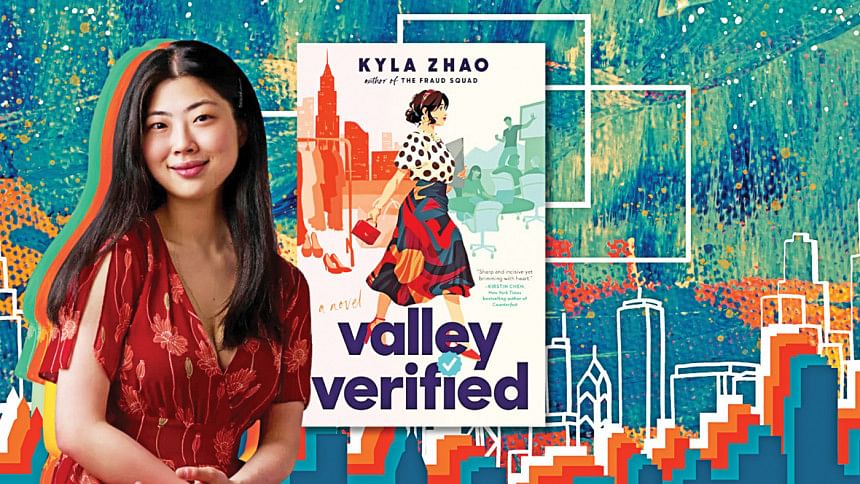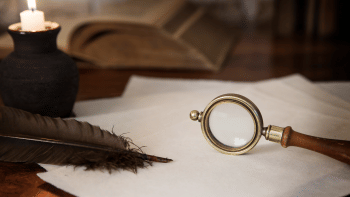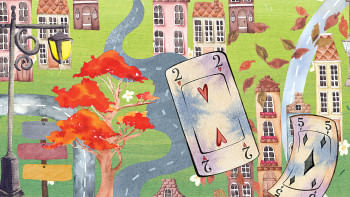A look at AAPI representation in tech with Kyla Zhao of ‘Valley Verified’

This week, Kyla Zhao, the author of Valley Verified (2024, Penguin Random House), graced us with an exclusive interview to give us insights into the changing trends in Asian American literature. Valley Verified follows the story of Zoe Zeng, a modern Gen Z woman navigating career challenges when she switched from being a high-end fashion columnist to a tech employee in Silicon Valley. As the story unfolds, the readers get to know more about the women in the tech industry and the difficulties they face behind the glitz of Silicon Valley.
As a woman in the tech industry, Kyla shared her experience as a young employee and the challenges many women face in the workplace and the changing tides in Asian American books.
Isn't it difficult balancing between work and writing?
I think it is difficult from a time perspective, but in a way both offer an escape from each other. I look forward to writing because it's a nice change of pace from my day job in tech, and vice-versa.
In this part of the world, a lot of people don't know about the Asian American Pacific Islanders Month. Can you brief our readers on this event and its significance?
This lasts throughout the month of May, and is more of a concept in America. I'm not sure if it's much of a concept in other western countries. Basically, it celebrates the AAPI community, our contributions to the world, and representation in the media. There wasn't a lot of diverse representation in the past, and whilst it's still not an ideal situation, we are starting to see a lot more coverage in the media of the AAPI community. That's really heartwarming.
Has the statistics for Asian representation changed over the years or is it still lacking in many ways?
We're definitely still in the minority. I think there has been a slight improvement in the numbers over the past decade, but we're nowhere close to where we should be yet.
However, one thing I've started to see is that we are creating a variety of AAPI stories. In the past, one well-known work of Asian-American literature was The Joy Luck Club by Amy Tan. I adore the book and think everyone should read it. But many people started to think that's the only kind of Asian story that could be told–it has to be an immigrant story which is quite sad and focuses on family trauma. For sure, those stories are valid because they speak about a very important part in a lot of Asian people's lives. But we're seeing Asians can also be part of joyful, uplifting. and upbeat stories. I think having variety in representation is incredibly important.
Our readers would also like to know more about you. Can you tell us more about your life and your move from Singapore to the US?
I was born and raised in Singapore, and I moved to the US after I finished high school to attend Stanford University. I graduated in 2021 with degrees in psychology and communications. Initially, I worked in fashion, but then I switched to tech–this pivot inspired Valley Verified. I never thought that I'd become an author even though I'm a bookworm. Because I love reading so much, I've never thought I'd write a book of my own that could measure up to the books I admire so much.
But during the pandemic in 2020, I couldn't go back home to my family in Singapore. Every country was shutting down its borders, so I spent most of 2020 living alone by myself in California. During that time, a lot of people were saying hateful things about the Asian community or committing hate crimes against Asians. It really troubled me that people from my community, people who looked like me, were portrayed in such a negative and derogatory manner. I wanted to see people like me be the stars of something fun and joyful. That's when I got the idea of writing a story like that, set in Singapore and featuring an all-Asian cast
How did you manage to secure your first book deal?
When I started writing, I didn't think about getting it published. I didn't think it was possible for a non-American to publish in America, so I never even considered it. For me, writing was a passion project. It was a hobby, somewhat of an escape for me since the real world was so depressing during the pandemic.
I made friends with other writers online, on Twitter. Some of them were trying to get published, and I learned the process from them. In America, if you want to be published by the big publishing houses, you need to get a literary agent. After nine months of working on my manuscript, I sent it out to different agencies, in the hopes that someone might love it enough to represent me as a client. To my surprise, I received interest from quite a few agents. After signing with a New York agent, she sent my book out to different publishers.. Again, it was a lot of praying and hoping that someone would want my book enough to pay for it. Finally, after getting interest from multiple publishers, I ended up selling it to Penguin Random House.
How has your writing evolved from then to now?
I think on one hand, I've become a more disciplined writer. When I was writing my first book, The Fraud Squad, I had no idea what it meant to write a book. I did no planning or outlining. As a result, there were a lot of plot holes that I had to go back and fix. But fixing a plot is like trying to fix a jigsaw puzzle. If you move one piece, you have to move all the surrounding pieces. There were a lot of ripple effects. Even though I finished the first draft of my first book in three months, it took me twice as long to edit it. It was such a mess!
For my second book, Valley Verified, I had grown a little smarter. I had a 27-page outline which I followed. However, while I have become a better and organised writer, there was a freedom and carefreeness in writing my first book, which I would never be able to recapture again. That time, I was writing just for myself without any deadlines, contracts, or obligations. I didn't care about reviews or anything whereas now, I am a lot more aware of them.
In the meantime, you also managed to transition from fashion to the tech industry which was an interesting transition.
It was an interesting but very hard transition. Honestly, in the first few months of my tech job was when I felt the least confident and depressed. I didn't have anyone to confide in because everyone was working remotely, and my family was across the world in Singapore. I also didn't want to admit to others that I failed to uphold the image of a successful Stanford graduate, so I was lying to people how well I was doing. In a way, I was also lying to myself. That's when I got the idea to write Valley Verified. I felt like creating this book of fiction gave me a safe space to explore my insecurities and accept them.
How did you incorporate your experience in Valley Verified?
In Valley Verified, I explored sexism in a spectrum. There are obvious of examples of sexism like sexual assault and sexual harassments. However, you still have the subtler forms of microaggressions, such as women always being asked to take notes in a meeting, organise happy hours, order office snacks and supplies even though that's not part of the job description. So, sexism can manifest in so many ways, and I wanted to convey all of that.
But at the end of the day, my experience is unique to myself, so I wanted to offer a more comprehensive portrayal of what women in the tech industry or any male-dominated industries face. I spoke to a lot of other women who work in tech. Some of them are in the beginning of their careers while others are from management, top executives, or retired. Everyone has encountered some forms of sexism at one point or another. Also, I read a lot of non-fiction books, memoirs, and auto-biographies by women in the tech industry to understand their history and their journey.
Can you give us a glimpse of the synopsis and characters of Valley Verified to the readers?
Zoe is a fashion writer in New York city, but she's forced to leave her fashion job and take up a new challenge in the tech industry. She moves from New York to California, from high fashion to high tech. In this cutthroat world of tech bros and tech billionaires, she's like a fish out of water. She has to battle not just hurdles from others but also her own insecurities about whether she belongs there. It's like Legally Blonde but set in Silicon Valley
As you said, women, especially Asian women, are vulnerable in Silicon Valley. How do you want to inspire them through your books?
I want them to be able to see themselves in my book and tell them they are not alone in feeling this way. They may become more empowered to confide their feelings and try to find a support system to get through things. I hope the book inspires them to be determined and speak up for themselves.
What kind of characters do you want to write about in the future?
First of all, I'll always be writing Asian characters. When I was younger, I never really read about many Asian characters. They were mainly sidekicks while the main character was a blonde, white girl with blue eyes. I didn't write books back then, but I wrote short stories where the main character would always be blonde with blue eyes. Since that was all I saw in the media, that's what it meant to me to be beautiful and popular.
But now, I'm trying to break past from there. I want young Asian girls to grow up seeing themselves, realising they can be the main character and the star of their own story. I also want to keep exploring the dynamic of being a woman in a space which may not be friendly towards women.
A lot of your audiences are Gen-Z right now. How is the Gen-Z female reader diaspora different from the reader bases we used to see while we were growing up?
I think Gen-Z has invented the phenomenon of 'girl boss'. Right now, there's a trend on Tik Tok and social media to reclaim your girlhood. There's a lot more willingness to move past the traditional roles of what women are supposed to look like and what they're supposed to do. It's still far from the ideal situation because I think a lot of Gen-Z feminism is Eurocentric. But, I think we're starting to realise women can do whatever they want. If they want to go into the workforce, they can. If they want to be the girl boss, they can. They also can stay home and be a homemaker. Each approach is equally valid.
What are the messages you want to give to your readers, especially to career-driven women?
I created this cast of female characters who are strong in their own way but also quite different. We have Zoe who struggles to separate her sense of self-worth from her performance at her job. When she's doing well at work, she feels good about herself, but when she's not doing well, she feels like a massive failure. Then her boss, Lillian, the COO of the startup, is the epitome of a strong career woman. She's powerful and driven, but at what cost? Then, Zoe's friend, Bernadette, used to be a successful career woman, but then she decides to step back from her career to focus on having a family. All these women want different things, and no approach is better than the other. It's all about figuring out what works for you and what you want at that stage of your life.
I also want to convey how women can support one another. I think from a very young age, girls are taught to see each other as competition. But when we see other women as competition, we let the men in power get away with too much. So, in my book, I want to create a cast of female characters who are different from one another in terms of personality and background, but they come together to support one another. I truly believe that when we help each other, that's when we become stronger.
One last thing would be the idea of imposter syndrome. I wrote this book as a way to tackle my own imposter syndrome, my insecurities, and low self-esteem. I just want other people, who are also going through big changes in life, to realise their feelings of discomfort and fear are valid and normal emotions. We don't have to beat ourselves up for feeling that way.
As a woman who worked in tech startups as well, I think this feeling is universal. Even in the eastern part of the world, women are treated differently at work for their behaviour and mistakes while their male counterparts get away easily if they do the same things.
One thing that surprised me was how a wide spectrum of women reached out to me after my book came out. Some of them were young like me, some were far along in their careers, and some were retired. They all said, "I can relate to what Zoey went through, and I faced the same issues." Those women were of different ages and at different career stages. This shows there have not been substantial changes, and in the past decades, women have been encountering the same pushback.
Do you think the Asian representation in the media is starting to grow and change?
I think it is, and I really hope it is not just token representation. There was a point in time when publishers would publish a story written by a person of colour, just to fill a diversity quota. They might reject a book, saying, "We can't buy your book because we just bought another book from an Asian author." That made diversity feel like a zero-sum game. I would like to believe that there is a movement towards a more comprehensive and diverse representation. I hope this lasts and is not a trend that dies off.
How do you think you and your fellow Asian authors are evolving with time?
Now, we're seeing more stories where the main character is an Asian, but she's so much more than her ethnicity. For instance, in the book, To all the Boys I've Loved by Jenny Han, the main character was Korean-American. However, it didn't mean anything because the focus was on her as a person. I wish we could see more of that representation.
You have another book coming out this year which uses chess games as its core premise. Can you give our readers a small sneak peek of that one?
Yes! It's called May the Best Player Win. It's suitable for pre-teens, teenagers, and also adults. So parents and kids can read it together. I'd say it's a family friendly version of The Queen's Gambit. I wanted to recapture an youthful innocence and bring in a younger perspective. My main character is a young chess player who makes a bet with her sexist rival that girls can be as good as boys in the game. But performance anxiety creeps in, and this not only affects her chess performance but also her love for the game. So, she asks herself, "Can you play for fun if you're playing to win?"
What's your advice to aspiring authors and writers who are looking to publish a book?
There's never a good time to start. I met so many people who want to write a book, but they say they don't have the time. The truth is, there's never a good time because life will always throw something your way. So, the best time to start was yesterday, and the second best time to start is today. Sit down for five to ten minutes, write a few sentences. Anything is better than nothing.
My second advice is never stop a writing session at the end of a chapter or scene. When you're looking at a blank page, it's hard to start writing. Hence, these days, when I finish writing a chapter, I force myself to write a few sentences for the next chapter as well. That way, when I start writing again the next day, I have these sentences in front of me, so it's easy to get the momentum going. It helps me overcome the inertia of starting.
Tashnuva Sumaiya Islam, when not reading, loves to paint, write, and share her photography on Instagram! Follow her @tea_tae93 or email her at [email protected].

 For all latest news, follow The Daily Star's Google News channel.
For all latest news, follow The Daily Star's Google News channel. 










Comments